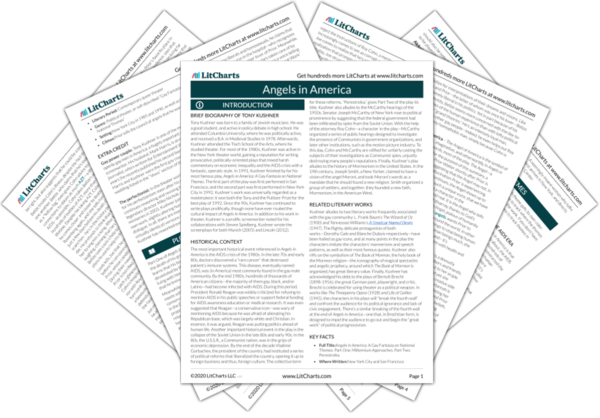Summary
Analysis
In the hospital, Prior—now awake—gets a surprise visit from an old friend, a drag queen named Belize. Belize offers Prior an ointment—“not Western medicine,” Prior mutters. Belize claims to be a health professional. He rubs the ointment on Prior’s back.
From the beginning, Belize is portrayed as someone on the outskirts of American society—he’s black, he’s gay, and he dresses in drag. (Even his name is that of a foreign country.) His immediate connection to “non-Western” medicine highlights this outsider status, which also gives Belize a special insight into aspects of America that the play’s white, more traditionally masculine characters miss.
Themes
Prior asks Belize if he’s heard from Louis. Prior explains that it’s been a long time since Louis has been to see him. Prior weeps, and Belize embraces him tenderly. Prior tells Belize that the painkillers he’s on make him hear a strange voice in his head. Belize asks Prior what the voices say, but Prior doesn’t answer.
Belize’s behavior around Prior is just the opposite of Louis’s. Belize is tender, and even touches Prior. Kushner suggests that it is possible, and even necessary, to be tender with AIDS victims, especially when the stigma surrounding the disease is lifted—Prior can’t possibly infect anyone just through everyday contact and proximity.
Themes
Prior tells Belize that he’s attracted to one of his male nurses—the nurse gives him an erection. Belize remembers when he and Prior were lovers. Abruptly, he tells Prior that he has to go—he can’t be “looking after white people all the time.” Belize tells Prior not to get “crazy,” and to eat more. With these words, he walks out.
It’s telling that Belize and Prior used to be lovers but aren’t anymore. Belize clearly loves Prior, but he also maintains a certain distance from him, which actually makes him more likely to express sympathy and compassion for Prior as an AIDS victim. Belize is presented as one of the wiser characters in the play, perhaps because his experience is so different from the others (Prior, Louis, and Joe are all stigmatized for being gay, but they’re still white and seemingly masculine-presenting, unlike Belize).
Themes
As soon as Belize leaves the room, the room darkens. A strange female voice fills the room. The voice tells Prior that she will reveal herself to Prior very soon. The voice claims that Prior will begin a “great work” soon—he’s going to banish a “great lie.”
Kushner builds the suspense slowly and cleverly—we wonder what this “great work” consists of. The motif of religious prophecy and the fantastical also continues to grow.
Themes
Get the entire Angels in America LitChart as a printable PDF.













